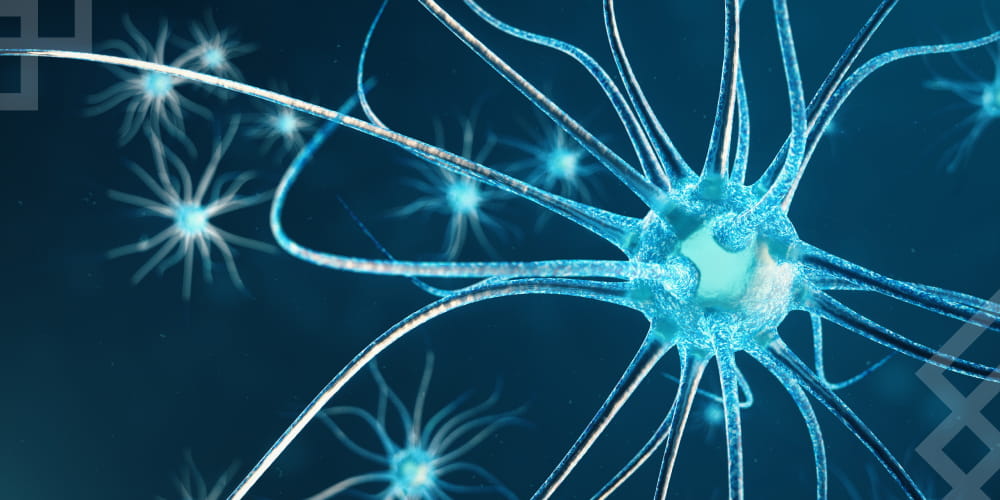Have you ever realized what is responsible for your every movement and even mind? Just imagine what is happening inside your body when you are smiling, smelling a tasty pizza, or listening to your favorite song? Your sense organs send messages to a brain by chemical and electrical changes in cells, scientifically known as neurons, that make up the nerves.
Difference between a nerve and neuron
- What are neurons? Neurons, also known as nerve cells, send and receive signals from your brain. While neurons have a lot in common with other types of cells, they’re structurally and functionally unique.
- What is a nerve? A nerve is a bundle of fibers composed of neurons that uses electrical and chemical signals to transmit sensory and motor information from one body part to another.
When talking about taking care of your body, your nerves’ health seems to be the most essential point, as the nervous system manages the whole body and affects all its parts. After reading this article about the nervous system, be ready that your life won’t be previous anymore, as nerve cells do not regenerate.
Let’s get down to the information below to discover what is nerve and get familiar with all types of nerves. Stay with us to always be aware and updated.
What is the nerve and its function
Getting to the nerves‘ definition, nerves are cord-like structures whose primary role is to provide a pathway to conduct electrical impulses throughout the body. It essentially relays information from one part of the body to another.
Nerves can be categorized into two groups based on function:
- An afferent nerve fiber conducts sensory information from sensory neurons to the central nervous system, where the data is then processed. In the peripheral nervous system, bundles of fibers or axons are called nerves, and bundles of afferent fibers are known as sensory nerves.
- An efferent nerve fiber conducts signals from motor neurons in the central nervous system to muscles. Bundles of these fibers are known as efferent nerves.
What are the three types of nerves?
- What are autonomic nerves? These nerves manage your organism’s involuntary or partially voluntary activities, including heart rate, blood pressure, sweating, digestion, and temperature regulation.
- What are motor nerves? Motor nerves, composed of motor neurons, that manage your movements and actions by passing information from your brain and spinal cord to your muscles. This permits people to do any exercises and activities like playing football, or moving fingers to play the guitar, etc.
- What are sensory nerves? What are sensory nerves do? Sensory nerves relay information from your skin and muscles back to your spinal cord and brain. Special sensors in the skin and deep inside the body help people identify if an object is sharp, rough, or smooth, if it’s hot or cold, or if a body part is still or in motion.
What does nerve damage feel like
- Faster or slower heart rate
- Problems with sweating, swallowing, and urination
- Sex dysfunction
- Muscle weakness
- Extreme sensitivity to touch
How to treat damaged nerves
Although treatment of damaged nerves exists and is in demand, in many cases, nerve damage cannot be completely healed. But various treatments can reduce your symptoms. Because nerve damage is often progressive, it is essential to consult with a doctor when you first notice symptoms. So do not waste your time and see the doctor to prevent forming any irreparable consequences. We prepared for you a list of powerful tips, which can meet everyone’s needs and be helpful to your health condition.
- Vitamins. Some cases of peripheral neuropathy are related to vitamin deficiencies. Vitamin B is essential for your nerve health. Its lack can lead to significant nerve damage. While you can get vitamin B from your meals, your doctor may also recommend taking a supplement. Stick to the recommended dose to prevent toxicity and worsening symptoms.
Vitamin D can also help prevent nerve pain. Your skin typically produces vitamin D in response to sunlight. Its deficiency can cause neuropathy pain. Taking a supplement can help reduce the symptoms of neuropathy.
- Quit bad habits. Smoking affects your blood circulation making the blood vessels narrow, and decrease the amount of oxygenated blood that gets through. Without proper blood circulation, you may experience increased numbness and pain from your peripheral neuropathy. Eliminating smoking habits can help to improve your condition. You should admit that stop smoking is the right decision anyway, which will make you feel better.
- Take a warm bath. Taking a warm bath can be soothing and can also alleviate pain symptoms from neuropathy. Warm water increases blood circulation throughout the body, decreasing pain symptoms from numbness.
If your sensory nerves are affected by peripheral neuropathy, and you’re not as sensitive to temperature, be careful not to make your bath water too hot.
- Do some exercise. Regular exercise can help to combat pain and improve your overall health. Being active can reduce your blood sugar, which, in turn, can reduce or slow down nerve damage. Exercise also increases blood flow to your arms and legs and reduces stress. These are all factors that help to minimize discomfort and pain.
- Meditate. A perfect opportunity to look at the world differently and keep calm will help you get rid of stress. Meditation techniques can help people struggling with neuropathy symptoms live through their pain. It can help to lower stress, improve your coping skills, and decrease your pain intensity. Taking a mind-body approach is a non-invasive technique that provides you with more control over your condition.
Healthy body, healthy mind, right? You should treat any strange changes in your body seriously, which can be a signal for action, as the nervous system covers the whole body, and damaged nerves may be a cause of any kind of diseases, with which you should be incredibly accurate. Don’t take it too long, and make an appointment today!
Bottom Line
The treatment process is quite complicated. It requires a very high-quality preliminary diagnosis, which allows the neurologist to assess the type and degree of nerve damage, as well as the general physiological state of the patient.
At Lone Star Neurology, therapy is always carried out in combination with the simultaneous treatment of a concomitant disease that causes damage to the neurons. After a thorough diagnosis, the neurologist determines the treatment tactics depending on the form of the disease, the severity of its course and the causes that provoked the defeat of neuromuscular conduction.
Need to treat peripheral nerves in a specialised clinic or have any questions? Contact Lone Star Neurology, and our specialists will conduct a comprehensive consultation and help you solve your problem! We provide our services in different cities in Texas, including Dallas, McKinney, Richardson, and others.






 (4 votes, average: 3.75 out of 5)
(4 votes, average: 3.75 out of 5)






Please, leave your review
Write a comment: